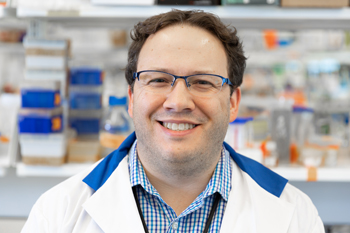Understanding the body’s ‘first responders’ to infection on a basic science level

By Ana Gajic

Dr. Greg Fairn
Dr. Greg Fairn considers being a scientist both a profession and a full-time hobby.
As a researcher at the Keenan Research Centre for Biomedical Science (KRCBS), Dr. Fairn finds a joy in his work that makes it feel like it is more than just a career.
“I think of sitting in my office and writing papers and grants as the largest part of my day – but when I get to discuss research with trainees, go into the lab and do things with my hands, that’s the most fun I can have,” he says.
Coming up on his eighth year at the KRCBS, Dr. Fairn’s research focuses on how cell metabolism – the set of chemical reactions that occur in living organisms in order to maintain life – affects cell function. Ultimately, his lab aims to better understand how the cellular processes they study impact cancer, heart disease and infectious diseases.
One of his team’s largest areas of focus is white blood cells, which are cells of the immune system and are known as macrophages and neutrophils. These cells are the body’s first responders to infection and play a role in maintaining the normal state of tissues and clearing dead cells in the body. Dr. Fairn and his lab aim to understand how these cells function and impact key diseases.
“White blood cells impact most disorders or diseases,” he said. “For example, in obese patients, there’s a lot of inflammation in the fat cells and a lot of infiltrating macrophages. They’re always a player in pro-inflammatory conditions.”
Specific ongoing work in Dr. Fairn’s lab around macrophages and neutrophils includes examining how cells detect bacterial products and then turn on inflammation, which is something that happens in diseases such as Crohn’s disease – a type of inflammatory bowel disease (IBD) that may affect any part of the gastrointestinal tract. Another project in his lab aims to understand how macrophages deal with clearing dead cells from the body. If the one billion to 10 billion cells that die in our bodies everyday are not cleared properly, autoantibodies can occur and cause diseases such as lupus.
“We’re really trying to tell the whole story – from the basic structure of a protein all the way through to how it influences cellular function in humans,” he said.
The joy in discovery and the sense of community at the KRCBS and beyond is what keeps Dr. Fairn interested and engaged in science and research.
“There’s a lot of intellectual aspects to research – making predictions, having them come true, or even having them be proven wrong can be very gratifying,” he said.
“The contributions we make on the global stage from St. Michael’s are also fantastic. We continue to punch above our weight as an institute and that makes for a fun research environment.”
About St. Michael’s Hospital
St. Michael’s Hospital provides compassionate care to all who enter its doors. The hospital also provides outstanding medical education to future health care professionals in more than 27 academic disciplines. Critical care and trauma, heart disease, neurosurgery, diabetes, cancer care, care of the homeless and global health are among the Hospital’s recognized areas of expertise. Through the Keenan Research Centre and the Li Ka Shing International Healthcare Education Centre, which make up the Li Ka Shing Knowledge Institute, research and education at St. Michael’s Hospital are recognized and make an impact around the world. Founded in 1892, the hospital is fully affiliated with the University of Toronto.
About Unity Health Toronto
Unity Health Toronto, comprised of Providence Healthcare, St. Joseph’s Health Centre and St. Michael’s Hospital, works to advance the health of everyone in our urban communities and beyond. Our health network serves patients, residents and clients across the full spectrum of care, spanning primary care, secondary community care, tertiary and quaternary care services to post-acute through rehabilitation, palliative care and long-term care, while investing in world-class research and education. For more information, visit www.unityhealth.to.
